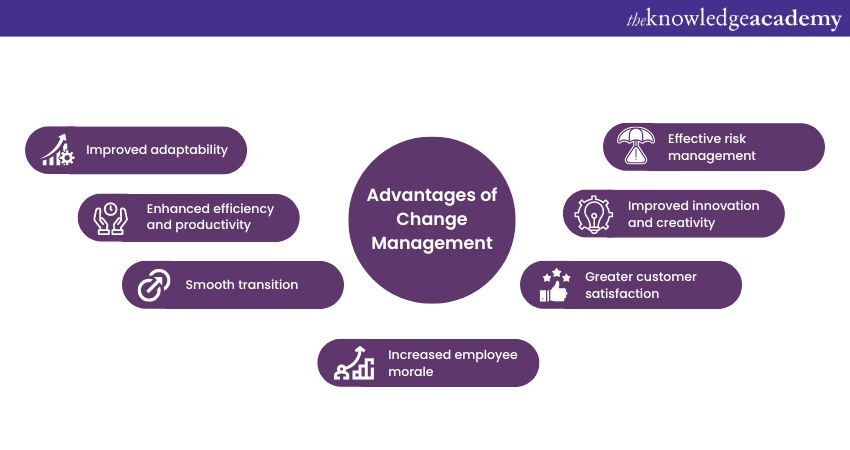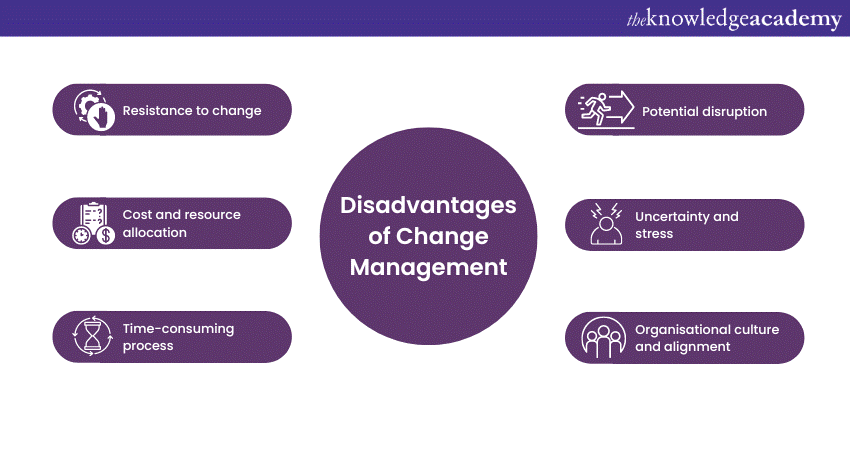We may not have the course you’re looking for. If you enquire or give us a call on +44 1344 203 999 and speak to our training experts, we may still be able to help with your training requirements.
Training Outcomes Within Your Budget!
We ensure quality, budget-alignment, and timely delivery by our expert instructors.

Change is an inevitable part of any organisation's journey towards growth and success. However, managing change effectively is crucial to ensure a smooth transition and minimise any negative impact on the business. By understanding the pros and cons of Change Management, businesses can make implement strategies to facilitate successful organisational changes. This blog will tell you all you need to know about Change Management Advantages and Disadvantages, and help you make informed decisions for your organisation.
Table of Contents
1) What is Change Management?
2) Advantages of Change Management
a) Improved Adaptability
b) Enhanced Efficiency and Productivity
c) Smooth Transition
d) Increased Employee Morale
e) Greater Customer Satisfaction
3) Disadvantages of Change Management
a) Resistance to Change
b) Cost and Resource Allocation
c) Time-consuming Process
d) Potential Disruption
e) Uncertainty and Stress
4) Conclusion
What is Change Management?
Before we delve into the advantages and disadvantages of Change Management Models, we will first define what is Change Management. Change Management refers to the structured approach organizations take to transition from their current state to a desired future state. It consists of a set of processes, change management tools, and techniques that aim to guide individuals, teams, and the entire organization through the change process. Change Management focuses on minimizing resistance to change, addressing the impact on employees, and ensuring that the desired outcomes are achieved.
Advantages of Change Management
Now that we have defined what Change Management means, we will move on to exploring Change Management pros and cons. Change Management brings several advantages to organisations, some of which are discussed as follows:

Change Management offers a multitude of advantages for organisations, empowering them to navigate transitions effectively and seize opportunities for growth and development through the implementation of a change management plan. Let's delve deeper into the various benefits that Change Management brings:
1) Improved adaptability: In today's rapidly evolving business landscape, adaptability is crucial for survival. Change Management promotes a culture of adaptability within organisations by encouraging employees to embrace change, learn new skills, and adjust to shifting market conditions. This adaptability helps businesses stay ahead of their competitors, respond swiftly to market trends, and capitalise on emerging opportunities.
2) Enhanced efficiency and productivity: Implementing Change Management practices often leads to improved efficiency and productivity. By evaluating existing processes, identifying inefficiencies, and streamlining workflows, organisations can eliminate bottlenecks and optimise resource allocation. This optimisation not only enhances operational efficiency but also empowers employees to work more effectively, resulting in higher productivity levels across the board.
Discover the Best Change Management Books! Read our top picks and transform your organization today!
3) Smooth transition: Change, if not managed properly, can disrupt operations and create uncertainty among employees. Change Management provides a structured framework and clear roadmap for navigating transitions smoothly. It ensures effective communication channels, transparent information sharing, and comprehensive stakeholder engagement, all of which contribute to a seamless transition.
4) Increased employee morale: Change Management places a strong emphasis on employee involvement and engagement throughout the change process. By seeking input, addressing concerns, and actively involving employees in decision-making, organisations promote a sense of ownership and empowerment. This involvement leads to increased employee morale, as individuals feel valued and recognised for their contributions.
5) Greater customer satisfaction: Change Management initiatives can have a direct positive impact on customer satisfaction. By focusing on improving customer experience during the change process, organisations can identify pain points and address them effectively. Whether it involves enhancing product features, streamlining service delivery, or optimising customer support, Change Management allows businesses to align their efforts with customer needs and preferences.
Get ready for your interview with our top Change Management Interview Questions.
6) Improved innovation and creativity: Change Management encourages organisations to adopt a more innovative and creative mindset. By challenging the status quo, embracing new ideas, and nurturing a culture of continuous improvement, organisations can unlock their creative potential. It creates an environment where experimentation and risk-taking are encouraged, leading to breakthrough innovations and novel approaches to problem-solving.
7) Effective risk management: Change Management enables organisations to detect and address any risks associated with the change. By conducting thorough risk assessments and developing mitigation strategies, organisations can minimise the impact of potential disruptions. It emphasises the importance of monitoring and evaluating the progress of change initiatives, allowing for timely adjustments and corrective actions to mitigate risks.
Upgrade your Change Management expertise and unlock new career opportunities with our Change Management Practitioner Course. Join now!
Disadvantages of Change Management
While Change Management offers numerous benefits, it is important to recognise and address its potential disadvantages. Overlooking change management principles will greatly impact the organization. Let's explore some of the common disadvantages of Change Management:

1) Resistance to change: One of the primary disadvantages of Change Management is that it can face resistance from individuals or groups within the organisation. Change disrupts familiar routines and introduces uncertainty, leading to resistance and reluctance to embrace the proposed changes. Overcoming resistance requires effective communication, building trust, addressing concerns, and involving employees in the entire change process.
2) Cost and resource allocation: Implementing Change Management process often involves significant costs, both in terms of financial resources and personnel. Organisations need to allocate sufficient funds and manpower to support the planning, implementation, and evaluation of the change initiative. Insufficient resources or budget constraints can hinder the effectiveness of efforts and lead to suboptimal outcomes.
3) Time-consuming process: Another one of the disadvantages of Change Management is that it is a time-consuming process that requires careful planning, stakeholder engagement, and continuous monitoring. It involves assessing the current state, defining the desired future state, creating a roadmap, implementing changes, and evaluating the results. Organisations must allocate adequate time and resources to ensure a thorough and well-executed change initiative.
Discover the Impact of Change Management Salaries on Career Growth and Organizational Success!
4) Potential disruption: Change, by its nature, can disrupt business operations and create temporary disruptions or challenges. It may lead to productivity declines, delays in delivering products or services, or conflicts among employees. Failure to address and mitigate potential disruptions can have a negative impact on the organisation's performance and employee morale.
5) Uncertainty and stress: Change often introduces uncertainty and can create stress among employees. The fear of the unknown, coupled with the additional workload and learning curves associated with change, can contribute to stress and anxiety. Failure to address employee concerns and manage stress levels can result in reduced productivity, decreased morale, and even resistance to the change itself.
6) Organisational culture and alignment: Change Management may face obstacles in organisations with deeply entrenched cultures or resistance to change. The existing organisational culture, values, and norms can influence how change is perceived and received. Aligning the proposed changes with the organisation's values and effectively communicating the benefits of the change can help overcome cultural barriers and increase acceptance.
Dive into the detailed Case Study on Change Management
Conclusion
All in all, Change Management is a vital aspect of organisational growth and adaptation. By leveraging and addressing the Change Management Advantages and Disadvantages, organisations can navigate change effectively, drive innovation, and achieve sustainable success. By adopting a structured and people-centric approach to Change Management, businesses can position themselves for long-term growth and resilience.
Do you want to improve your job prospects in Change Management? Then register now for our Certified Professional Change Management (CPCM) Course!
Frequently Asked Questions

The pros of Change Management include improved adaptability to evolving business landscapes and enhanced efficiency in operations.

The main challenges of Change Management include employee resistance to new ways of working and communication issues that can lead to confusion and delays. Additionally, lack of resources and difficulty with technology adoption are significant hurdles.

The Knowledge Academy takes global learning to new heights, offering over 30,000 online courses across 490+ locations in 220 countries. This expansive reach ensures accessibility and convenience for learners worldwide.
Alongside our diverse Online Course Catalogue, encompassing 17 major categories, we go the extra mile by providing a plethora of free educational Online Resources like News updates, Blogs, videos, webinars, and interview questions. Tailoring learning experiences further, professionals can maximise value with customisable Course Bundles of TKA.

The Knowledge Academy’s Knowledge Pass, a prepaid voucher, adds another layer of flexibility, allowing course bookings over a 12-month period. Join us on a journey where education knows no bounds.

The Knowledge Academy offers various Change Management Certification, including the Change Management Foundation & Practitioner Course, Change Management Black Belt Course and Complete Change Management Assessments Training. These courses cater to different skill levels, providing comprehensive insights into Change Manager
Our Project Management Blogs cover a range of topics related to Change Management, offering valuable resources, best practices, and industry insights. Whether you are a beginner or looking to advance your Project Management skills, The Knowledge Academy's diverse courses and informative blogs have got you covered.
Upcoming Project Management Resources Batches & Dates
Date
 Change Management Foundation & Practitioner
Change Management Foundation & Practitioner
Mon 16th Dec 2024
Mon 6th Jan 2025
Mon 13th Jan 2025
Mon 20th Jan 2025
Mon 27th Jan 2025
Mon 3rd Feb 2025
Mon 10th Feb 2025
Mon 17th Feb 2025
Mon 24th Feb 2025
Mon 3rd Mar 2025
Mon 10th Mar 2025
Mon 17th Mar 2025
Mon 24th Mar 2025
Mon 31st Mar 2025
Mon 7th Apr 2025
Mon 28th Apr 2025
Mon 12th May 2025
Mon 19th May 2025
Mon 9th Jun 2025
Mon 23rd Jun 2025
Mon 7th Jul 2025
Mon 21st Jul 2025
Mon 4th Aug 2025
Mon 18th Aug 2025
Mon 1st Sep 2025
Mon 15th Sep 2025
Mon 29th Sep 2025
Mon 13th Oct 2025
Mon 20th Oct 2025
Mon 27th Oct 2025
Mon 3rd Nov 2025
Mon 10th Nov 2025
Mon 17th Nov 2025
Mon 24th Nov 2025
Mon 1st Dec 2025
Mon 8th Dec 2025
Mon 15th Dec 2025







 Top Rated Course
Top Rated Course



 If you wish to make any changes to your course, please
If you wish to make any changes to your course, please


